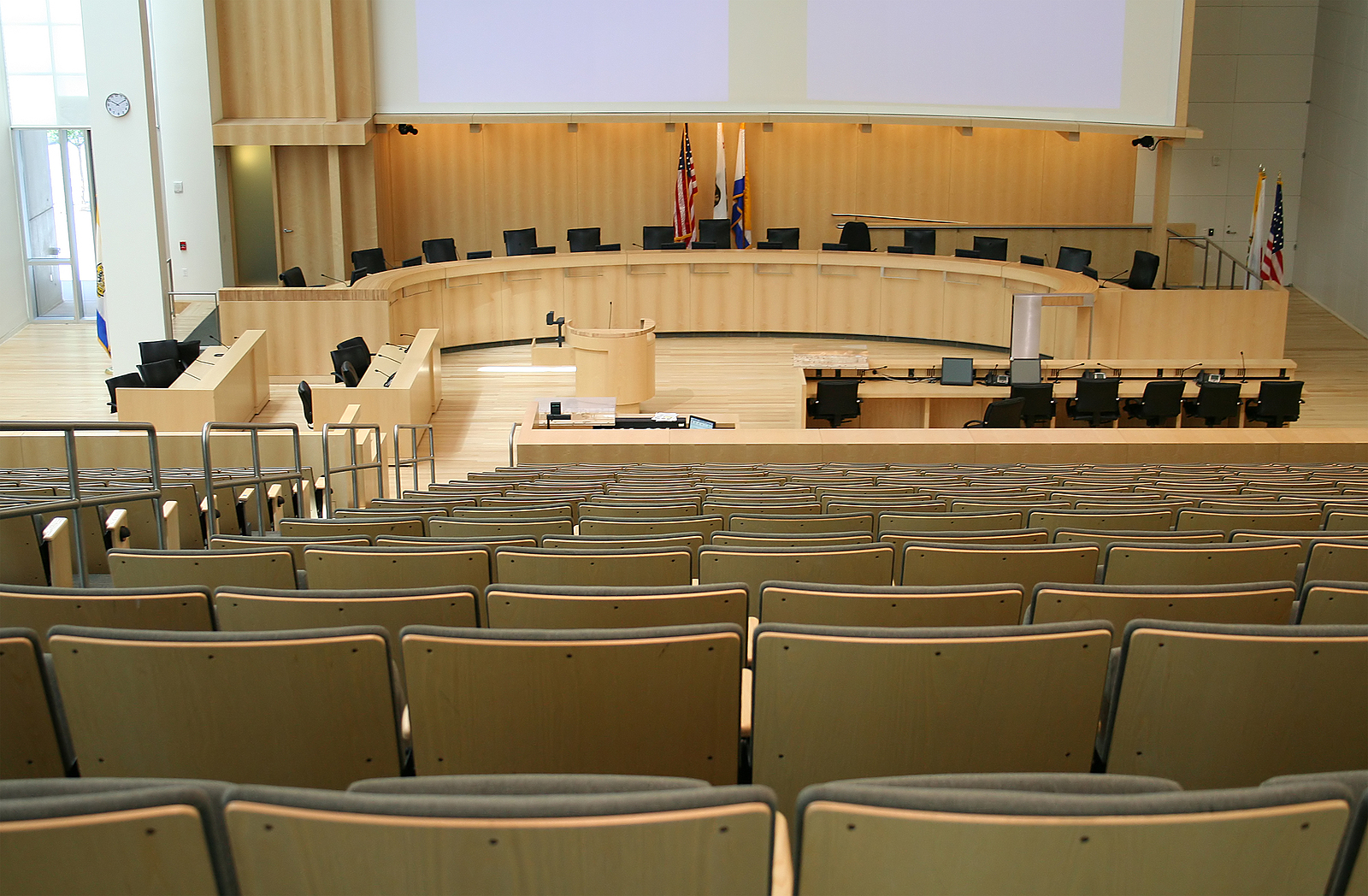Running efficient and successful city council meetings requires a lot of preparation and knowledge of proper procedures. The roles of the mayor, council members and city staff are different and each are important. Understanding these roles and having a plan in place can lead to well-run city council meetings.
Open Meetings Law
In Iowa, city councils and their advisory bodies are required to comply with the open meetings law (Code of Iowa, Chapter 21). The law requires that meetings of governmental bodies are open to the public. A meeting is a gathering of a majority of members (or quorum) discussing city business. The city must give public notice of its council meetings and include the time, date, place of each meeting, and the tentative agenda. The city needs to advise the media which have filed a request for notice and post the notice on a bulletin board or other prominent place easily accessible to the public at the city’s principal office. If there is no city hall, the notice should be posted at the building where the meeting will be held. Notice must be provided at least 24 hours prior to the meeting.
For a full explanation of Iowa’s open meetings law, please visit the Open Meetings page.
Setting the Agenda
Each city council has the authority to decide how its meeting agenda will be set. Code of Iowa Section 372.14 specifies the mayor as being “the chief executive officer of the city and the presiding officer of the council.” As such, in many cities, the responsibility for establishing the agenda for the city council meeting falls to the mayor and key city staff, such as the city manager or city clerk. In some cases, this may be established by city ordinance.
On the other hand, Code of Iowa Section 372.13 (5) states that “the council shall determine its own rules and maintain records of its proceedings.” This law allows councils to set rules, such as how the agenda will be set, for their council meetings. In some cities, the council has determined that each member of the council, as well as the mayor, has the right to place items on the agenda.
With several options available to cities, it’s important that clear rules of procedure are adopted by the city council. Rules of procedure are guidelines established by the council outlining the manner in which the council will conduct its business, including rules for creating the council agenda.
Discussion and Public Hearings
During a meeting, the city council will address various items related to city business. Among other actions, they will approve minutes, license applications, new city regulations, bills and budgets. Council members and the mayor will often discuss items before taking a vote to ensure there is an understanding of the proposed action. State law requires that city councils hold public hearings before taking action on certain items. Public hearings are intended to provide the public in general and those particularly affected by a proposed municipal action the opportunity to provide input regarding the policy options available to the city council. Supporters of a proposal can explain why they believe a particular course of action is necessary or helpful, and those opposed to the proposed policy can explain why they believe such action is unnecessary or detrimental.
For a detailed explanation and list of when public hearings are required, please visit the Public Hearings section.
Public Participation
While the open meetings law gives the public the right to attend meetings of governmental bodies, the law does not require cities to allow public input at council meetings. The council may permit an audience member to speak at its meetings but is not required to do so. Without an invitation to speak, everyone is simply an observer listening and watching the deliberations. That said, it’s a best practice to allow public comments in some fashion as it can be an effective citizen engagement tool and help the council understand community needs.
To help prevent a public comment period from becoming prolonged and unproductive, cities find it useful to establish rules for public comments. For example, limitations can be placed on the time and manner of public participation to help maintain efficiency. Those wishing to address the council can be asked to identify themselves by name and address and avoid repeating what already has been said.
Many cities place an item on the agenda such as “Public Comments,” where audience members are allowed to address the council. It may be helpful to reserve such time at the beginning or end of the meeting to give people the opportunity to speak before or after the council takes action on any business. Additionally, the council may allow the public to address any issue or restrict them to agenda or non-agenda items only. Some cities invite the public to provide input at the time each individual agenda item is discussed. Other cities may take a more formal approach and require advance notice to get on the agenda.
Motions, Resolutions and Ordinances
To conduct business, the city council takes one of three actions: motions, resolutions or ordinances. Motions are used to handle the routine business of the city at council meetings and are recorded in the minutes. Actions typically addressed by a motion include approval of the minutes, claims, licenses, permits and giving direction to city staff on a particular issue.
A resolution is a statement of policy. Examples include setting council rules and procedures, setting wages and salaries and establishing investment and other financial and employment policies. In certain cases, the passage of a resolution is required by Iowa law.
An ordinance is a city law of a general or permanent nature. Ordinances cover all areas of municipal authority, from setting speed limits on city streets to establishing water and sewer rates.
Voting Regulations
Motions require a majority vote of the quorum at the meeting to pass. For resolutions, ordinances and amendments to such, a majority of the total number of seats on the council must vote affirmatively for passage. All council members are defined to include any vacancy and any council member who is absent, but does not include the seat of a council member who does not vote due to a conflict of interest.
Resolutions can be passed with a majority of votes at one meeting. Ordinances and amendments to ordinances must be passed by the majority at three council meetings before becoming final. However, city councils can waive the requirement to have three votes to approve an ordinance or amendment by approval of at least three-fourths of the council.
In most cities, the mayor has no authority to vote on city council business. The Mayor-Council form of government is the most common form of government in Iowa. Under this form of government, the mayor is not a member of the council and cannot vote, with one exception. Section 372.4 of the Code of Iowa authorizes mayors in cities with an even number of council members to break a tie on motions not involving ordinances, resolutions or appointments made by the council alone. A vacancy on a five-member council does not make the council have an even number – the number of seats is still five.
In special charter cities operating with ten council members, the mayor may vote to break a tie on all measures. Under the commission, council-manager-at-large and council-manager-ward forms of government, the mayor is a member of the council and can vote on all matters before the council.
Role of the Mayor
The majority of cities in Iowa operate under the Mayor-Council form of government with an odd number of council members. Under this form of government, the mayor never votes, not even to break a tie. The mayor has no veto authority over a motion, but the mayor can veto a resolution or ordinance (or amendments to such) within 14 days after the council passes it. The mayor must give the council a written explanation of the reasons for the veto at the time of the veto. Within 30 days after the veto, the council may re-pass the resolution, ordinance or amendment with at least a two-thirds vote of the council. The mayor is also the presiding officer of the council as described in Section 372.14 and is often tasked with leading city council meetings and enforcing any rules and procedures adopted by the council.
Effective Dates
A motion requires no action by the mayor and is effective immediately. A resolution becomes effective after the mayor signs it. Ordinances and amendments take effect after they have been signed by the mayor and have been published, unless a subsequent effective date is provided. If the mayor does not sign or does not veto a resolution, ordinance or amendment, a resolution becomes effective 14 days after passage. An ordinance or amendment becomes effective after 14 days and publication unless a subsequent effective date is provided.
Closed Sessions
Government bodies are authorized to “close” a meeting, or deny public access, for certain reasons listed in Code of Iowa Section 21.5. The list is short and includes reasons such as discussing litigation with their attorney, discussing real estate transactions, and certain personnel situations within certain parameters.
The following are steps to hold a closed meeting:
- Add a potential closed session to the council meeting agenda, citing the allowed purpose pursuant to Code Section 21.5.
- Begin in open session.
- A two-thirds vote is required to go into a closed session and state the reason under Code of Iowa Section 21.5 that permits a closed session.
- Detailed minutes and audiotape must be taken of the closed session.
- Motion and vote to end the closed session and return to the open session.
The minutes and recordings from the closed session are confidential. They must be sealed and kept for at least one year and can only be opened by court order. The State Ombudsman may have access to the minutes and audio recordings of a closed session without obtaining a court order when such examination is relevant to an investigation under Code Chapter 2C and the information sought is not available through other reasonable means. For more information, please visit the Closed Sessions page.






